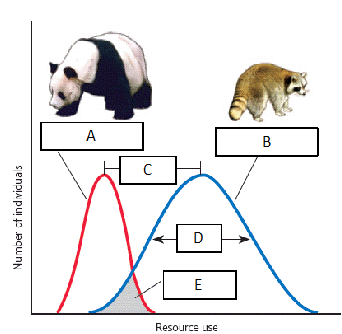Exam 4: Biodiversity and Evolution
Exam 1: Environmental Problems, Their Causes, and Sustainability90 Questions
Exam 2: Science, Matter, Energy, and Systems90 Questions
Exam 3: Ecosystems: What Are They and How Do They Work90 Questions
Exam 4: Biodiversity and Evolution90 Questions
Exam 5: Biodiversity, Species Interactions, and Population Control90 Questions
Exam 6: The Human Population and Its Impact90 Questions
Exam 7: Climate and Biodiversity100 Questions
Exam 8: Aquatic Biodiversity93 Questions
Exam 9: Sustaining Biodiversity: The Species Approach90 Questions
Exam 10: Sustaining Terrestrial Biodiversity: The Ecosystem Approach90 Questions
Exam 11: Sustaining Aquatic Biodiversity90 Questions
Select questions type
According to the International Union for Conservation of Nature (IUCN), about ____% of all known amphibian species are threatened with extinction.
(Multiple Choice)
4.8/5  (42)
(42)
 Use the figure above to answer the following question(s). Which of the two animals, the panda or the raccoon, is considered a generalist? Why?
Use the figure above to answer the following question(s). Which of the two animals, the panda or the raccoon, is considered a generalist? Why?
(Essay)
4.8/5  (31)
(31)
Species that are only found in one area are called _______________ and are especially vulnerable to extinction.
(Short Answer)
4.8/5  (36)
(36)
According to some scientists, the more diverse an ecosystem is, the ____ it will be.
(Multiple Choice)
4.9/5  (36)
(36)
According to the International Union for Conservation of Nature, more than ____ percent of all known amphibian species are declining in numbers.
(Short Answer)
4.9/5  (39)
(39)
The loss of a(n)____________________ species can lead to population crashes and extinctions of other species in a community that depend on it.
(Short Answer)
4.8/5  (30)
(30)
The diversity that enables life on the earth to adapt and survive environmental changes is called ____.
(Multiple Choice)
4.9/5  (41)
(41)
The number of species on the planet at any time is a result of the interaction between the processes of ____________________ and ____________________.
(Short Answer)
4.9/5  (29)
(29)
Species that migrate into, or that are deliberately or accidentally introduced into, an ecosystem are called ____________________.
(Short Answer)
4.8/5  (35)
(35)
The variety of terrestrial and aquatic ecosystems found in an area or on the earth is called ____.
(Multiple Choice)
4.9/5  (35)
(35)
Estimates indicate the average annual background extinction rate is one species lost for each million species on earth per year.
(True/False)
4.8/5  (25)
(25)
Many of the world's amphibian species are adapting rapidly to the environmental changes that are taking place in their habitats, which have been caused by human activities during the past few decades.
(True/False)
4.7/5  (40)
(40)
Genetic variability in a population is the result of ____________________.
(Short Answer)
4.9/5  (37)
(37)
A(n)____________________ is a significant increase in extinction rates above the background level.
(Short Answer)
4.8/5  (39)
(39)
From a scientific point of view, which of the following is true ?
(Multiple Choice)
4.8/5  (28)
(28)
What advantage does the characteristic indicated by letter D bestow upon the animal who occupies this niche, as opposed to the animal occupying the other niche?
(Essay)
4.9/5  (36)
(36)
Research performed by Edward O. Wilson on ____ has been applied to the study and understanding of other social organisms, including humans.
(Multiple Choice)
4.8/5  (43)
(43)
Non-native species can spread rapidly if they find a new location with favorable conditions, often because they do not face the same ____ that they face in their native niches.
(Multiple Choice)
4.8/5  (43)
(43)
Showing 21 - 40 of 90
Filters
- Essay(0)
- Multiple Choice(0)
- Short Answer(0)
- True False(0)
- Matching(0)